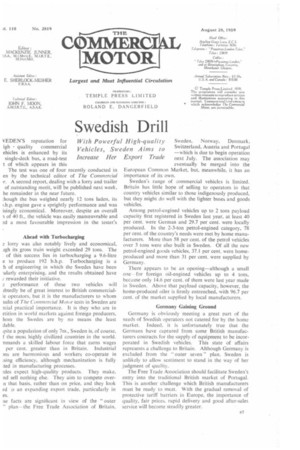Swedish Drill
Page 39

If you've noticed an error in this article please click here to report it so we can fix it.
VEDEN'S reputation for igh quality commercial aides is enhanced by its single-deck bus, a road-test t of which appears in this The test was one of four recently conducted in en by the technical editor of The Commercial r. A second report, dealing with a lorry and trailer of outstanding merit, will be published next week, he remainder in the near future.
.hough the bus weighed nearly 12 tons laden, its i.h.p. engine gave a sprightly performance and was isingly economical. Moreover, despite an overall 1. of 40 ft., the vehicle was easily manceuvrable and a most favourable impression in the tester's Ahead with Turbocharging lorry was also notably lively and economical, igh its gross train weight exceeded 29 tons. The of this success lies in turbocharging a 9.6-litre e to produce 192 b.h.p. Turbocharging is a h of engineering in which the Swedes have been :ularly enterprising, and the results obtained have ( rewarded their initiative.
performance of these two vehicles will tbtecily be of great interest to British commercial[e operators, but it is the manufacturers to whom suits of The Comnimial Motor tests in Sweden are !.cial practical importance. It is they who are in atition in world markets against foreign producers, horn the Swedes are by no means the least ipite a population of only 7m,, Sweden is, of course, f the most highly civilized countries in the world. nmands a skilled labour force that earns wages per cent, greater than in Britain. Industrial ins are harmonious and workers co-operate in ising efficiency, although mechanization is fully ited in manufacturing processes.
!des expect high-quality products. They make, nd sell nothing else. They aim to -compete overn that basis, rather than on price, and they look rd to an expanding export trade, particularly in es.
:se facts are significant in view of the "outer " plan—the Free Trade Association of Britain, Sweden, Norway, Denmark, Switzerland, Austria and Portugal —which is due to begin operation next July. The association may eventually be merged into the European Common Market, but, meanwhile, it has an importance of its own.
Sweden's range of commercial vehicles is limited. Britain has little hope of selling to operators in that country vehicles similar to those indigenously produced, but they might do well with the lighter buses and goods vehicles.
Among petrol-engined vehicles up to 2 tons payload capacity first registered in Sweden last year, at least 40 per cent. were German and 29.7 per cent. were locally produced. In the 2-3-ton petrol-engined category, 78 per cent. of the country's needs were met by home manufacturers. More than 58 per cent. of the petrol vehicles over 3 tons were also built in Sweden. Of all the new petrol-engined goods vehicles, 37.1 per cent, were homeproduced and more than 31 per cent, were supplied by Germany.
There appears to be an opening—although a small one-for foreign oil-engined vehicles up to 4 tons, because only 14.6 per cent. of them were last year made in Sweden. Above that payload capacity, however, the home-produced oiler is firmly entrenched, with 96.7 per cent. of the market supplied by local manufacturers.
Germany Gaining Ground Germany is obviously meeting a great part of the needs of Swedish operators not catered for by the home market. Indeed, it is unfortunately true that the Germans have captured from some British manufacturers contracts for the supply of equipment to be incorporated in Swedish vehicles. This state of affairs represents a challenge to Britain. Although Germany is excluded from the " outer seven" plan, Sweden is unlikely to allow sentiment to stand in the way of her judgment of quality.
The Free Trade Association should facilitate Sweden's entry into the traditional British market of Portugal. This is another challenge which British manufacturers must be ready to meet. With the gradual removal of protective tariff barriers in Europe, the importance of quality, fair prices, rapid delivery and good after-sales service will become steadily greater.




















































































































